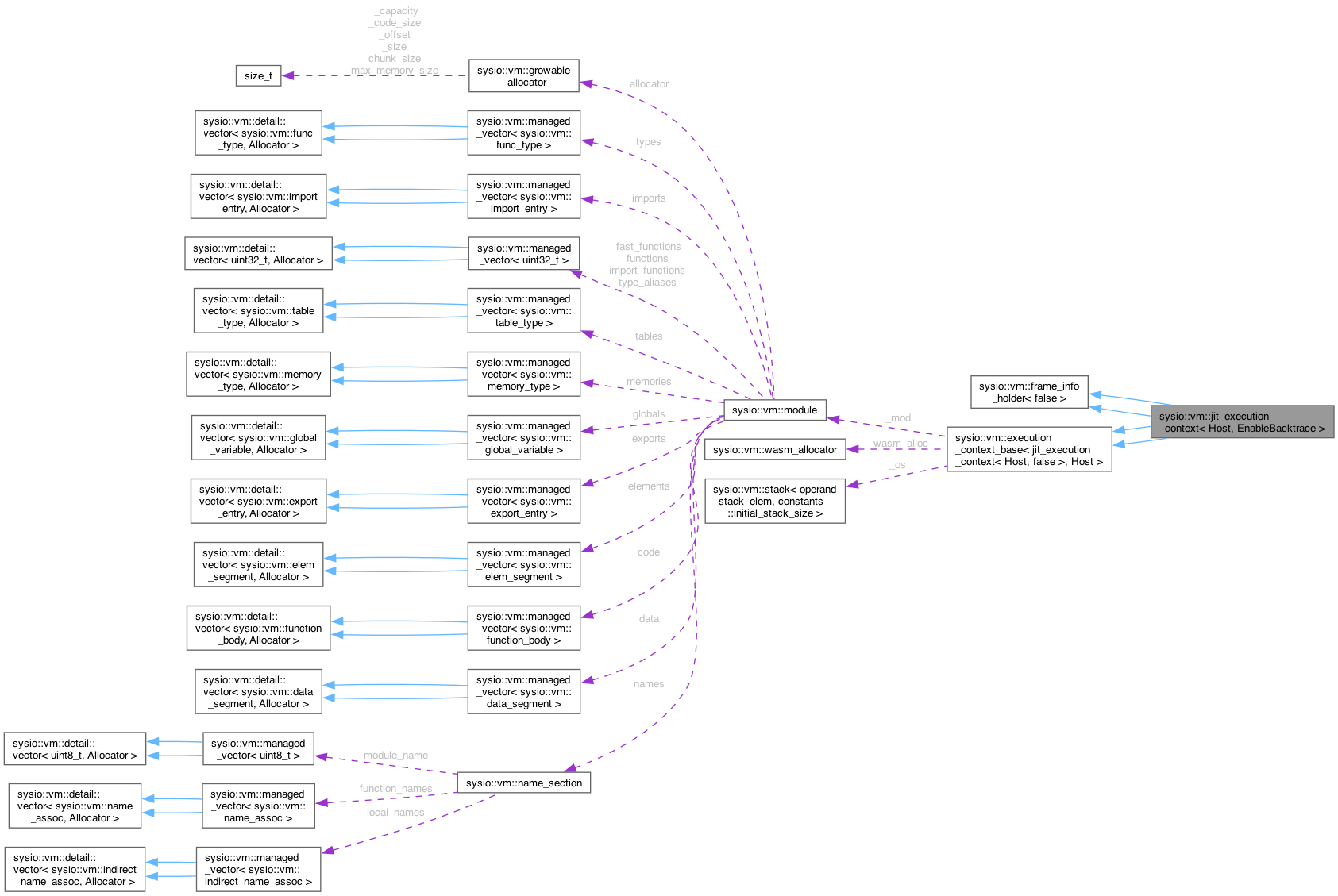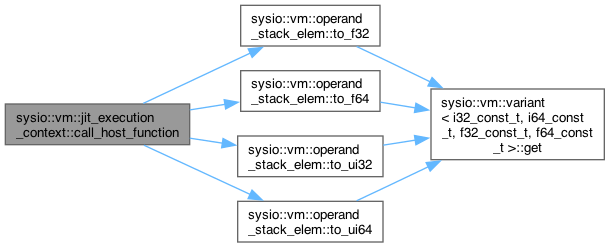#include <execution_context.hpp>


Public Member Functions | |
| jit_execution_context (module &m, std::uint32_t max_call_depth) | |
| void | set_max_call_depth (std::uint32_t max_call_depth) |
| native_value | call_host_function (native_value *stack, uint32_t index) |
| void | reset () |
| template<typename... Args> | |
| std::optional< operand_stack_elem > | execute (host_type *host, jit_visitor, uint32_t func_index, Args... args) |
| jit_execution_context (module &m, std::uint32_t max_call_depth) | |
| void | set_max_call_depth (std::uint32_t max_call_depth) |
| native_value | call_host_function (native_value *stack, uint32_t index) |
| void | reset () |
| template<typename... Args> | |
| std::optional< operand_stack_elem > | execute (host_type *host, jit_visitor, uint32_t func_index, Args... args) |
| template<typename Visitor , typename... Args> | |
| std::optional< operand_stack_elem > | execute (host_type *host, Visitor &&visitor, const std::string_view func, Args... args) |
| auto & | get_operand_stack () |
| const auto & | get_operand_stack () const |
| char * | linear_memory () |
| auto | get_interface () |
 Public Member Functions inherited from sysio::vm::execution_context_base< jit_execution_context< Host, false >, Host > Public Member Functions inherited from sysio::vm::execution_context_base< jit_execution_context< Host, false >, Host > | |
| jit_execution_context< Host, false > & | derived () |
| jit_execution_context< Host, false > & | derived () |
| execution_context_base (module &m) | |
| execution_context_base (module &m) | |
| int32_t | grow_linear_memory (int32_t pages) |
| int32_t | grow_linear_memory (int32_t pages) |
| int32_t | current_linear_memory () const |
| int32_t | current_linear_memory () const |
| void | exit (std::error_code err=std::error_code()) |
| void | exit (std::error_code err=std::error_code()) |
| module & | get_module () |
| module & | get_module () |
| void | set_wasm_allocator (wasm_allocator *alloc) |
| void | set_wasm_allocator (wasm_allocator *alloc) |
| auto | get_wasm_allocator () |
| auto | get_wasm_allocator () |
| char * | linear_memory () |
| char * | linear_memory () |
| auto & | get_operand_stack () |
| const auto & | get_operand_stack () const |
| auto & | get_operand_stack () |
| const auto & | get_operand_stack () const |
| auto | get_interface () |
| auto | get_interface () |
| void | set_max_pages (std::uint32_t max_pages) |
| void | set_max_pages (std::uint32_t max_pages) |
| std::error_code | get_error_code () const |
| std::error_code | get_error_code () const |
| void | reset () |
| void | reset () |
| std::optional< operand_stack_elem > | execute (host_type *host, Visitor &&visitor, const std::string_view func, Args... args) |
| std::optional< operand_stack_elem > | execute (host_type *host, Visitor &&visitor, const std::string_view func, Args... args) |
| void | execute_start (host_type *host, Visitor &&visitor) |
| void | execute_start (host_type *host, Visitor &&visitor) |
Static Public Member Functions | |
| static void | handle_signal (int sig) |
Public Attributes | |
| module & | _mod |
| detail::host_invoker_t< Host > | _rhf |
| std::error_code | _error_code |
Protected Member Functions | |
| template<typename T > | |
| native_value | transform_arg (T &&value) |
| template<typename T > | |
| native_value | transform_arg (T &&value) |
Protected Attributes | |
| host_type * | _host = nullptr |
| uint32_t | _remaining_call_depth |
 Protected Attributes inherited from sysio::vm::execution_context_base< jit_execution_context< Host, false >, Host > Protected Attributes inherited from sysio::vm::execution_context_base< jit_execution_context< Host, false >, Host > | |
| char * | _linear_memory |
| module & | _mod |
| wasm_allocator * | _wasm_alloc |
| uint32_t | _max_pages |
| detail::host_invoker_t< Host > | _rhf |
| std::error_code | _error_code |
| operand_stack | _os |
Additional Inherited Members | |
 Static Protected Member Functions inherited from sysio::vm::execution_context_base< jit_execution_context< Host, false >, Host > Static Protected Member Functions inherited from sysio::vm::execution_context_base< jit_execution_context< Host, false >, Host > | |
| static void | type_check_args (const func_type &ft, Args &&...) |
| static void | type_check_args (const func_type &ft, Args &&...) |
| static void | handle_signal (int sig) |
| static void | handle_signal (int sig) |
Detailed Description
class sysio::vm::jit_execution_context< Host, EnableBacktrace >
Definition at line 212 of file execution_context.hpp.
Constructor & Destructor Documentation
◆ jit_execution_context() [1/2]
|
inline |
Definition at line 226 of file execution_context.hpp.
◆ jit_execution_context() [2/2]
|
inline |
Definition at line 226 of file execution_context.hpp.
Member Function Documentation
◆ call_host_function() [1/2]
|
inline |
Definition at line 232 of file execution_context.hpp.

◆ call_host_function() [2/2]
|
inline |
Definition at line 232 of file execution_context.hpp.

◆ execute() [1/3]
|
inline |
Definition at line 272 of file execution_context.hpp.

◆ execute() [2/3]
|
inline |
Definition at line 272 of file execution_context.hpp.

◆ execute() [3/3]
|
inline |
Definition at line 151 of file execution_context.hpp.
◆ get_interface()
|
inline |
Definition at line 118 of file execution_context.hpp.
◆ get_operand_stack() [1/2]
|
inline |
Definition at line 116 of file execution_context.hpp.
◆ get_operand_stack() [2/2]
|
inline |
Definition at line 117 of file execution_context.hpp.
◆ handle_signal()
|
inlinestatic |
Definition at line 172 of file execution_context.hpp.
◆ linear_memory()
|
inline |
Definition at line 115 of file execution_context.hpp.
◆ reset() [1/2]
|
inline |
Definition at line 266 of file execution_context.hpp.
◆ reset() [2/2]
|
inline |
Definition at line 266 of file execution_context.hpp.
◆ set_max_call_depth() [1/2]
|
inline |
Definition at line 228 of file execution_context.hpp.
◆ set_max_call_depth() [2/2]
|
inline |
Definition at line 228 of file execution_context.hpp.
◆ transform_arg() [1/2]
|
inlineprotected |
Definition at line 400 of file execution_context.hpp.
◆ transform_arg() [2/2]
|
inlineprotected |
Definition at line 400 of file execution_context.hpp.
Member Data Documentation
◆ _error_code
| std::error_code sysio::vm::execution_context_base< Derived, Host >::_error_code |
Definition at line 190 of file execution_context.hpp.
◆ _host
|
protected |
Definition at line 478 of file execution_context.hpp.
◆ _mod
| module & sysio::vm::execution_context_base< Derived, Host >::_mod |
Definition at line 186 of file execution_context.hpp.
◆ _remaining_call_depth
|
protected |
Definition at line 479 of file execution_context.hpp.
◆ _rhf
| detail::host_invoker_t< Host > sysio::vm::execution_context_base< Derived, Host >::_rhf |
Definition at line 189 of file execution_context.hpp.
The documentation for this class was generated from the following files:
- libraries/sys-vm/include/sysio/sysio/vm/execution_context.hpp
- libraries/sys-vm/include/sysio/vm/execution_context.hpp